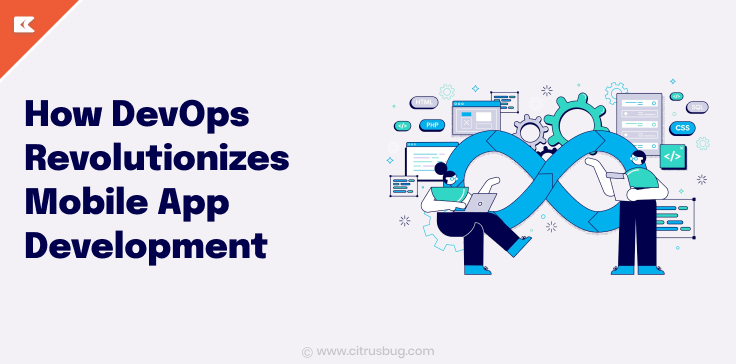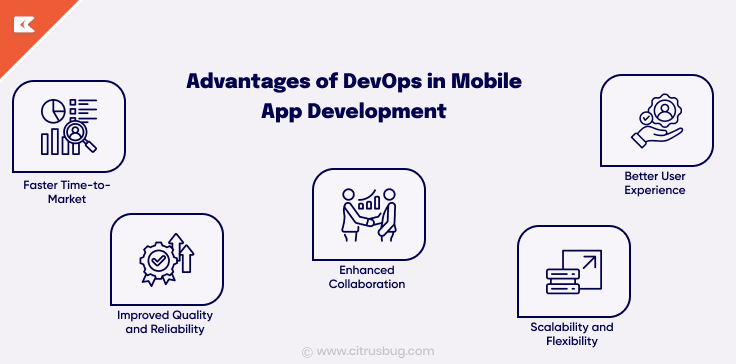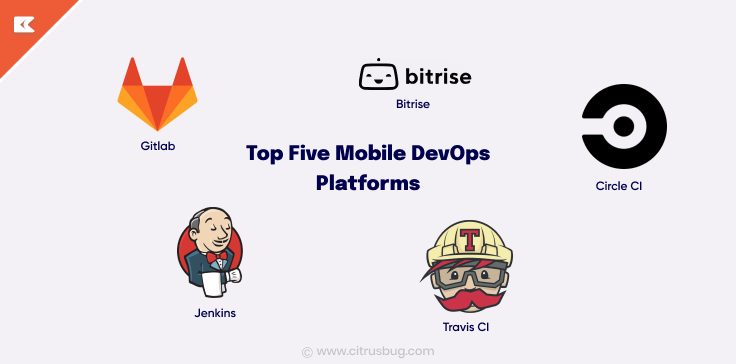How DevOps Revolutionizes Mobile App Development?
- September 16, 2024
-
3256 Views
- by Ishan Vyas

In a world where mobile application development is moving at a breakneck pace, where time to market, quality and efficiency are critical, DevOps adoption has become a true game-changing measurement for developing mobile applications where DevOps delivers ‘development’ and ‘operations’ together into one concept , the way it is tested and implemented changed. The article discusses how DevOps is changing mobile app development, explaining its uses, benefits and steps in a DevOps process in an efficient manner.
What is DevOps?
DevOps is a cultural and technological movement aligned with the intention of enriching collaboration between development and business teams. At its core, DevOps deals with the automation and simplification of all processes related to software development and deployment. It puts focus on continuous integration, delivery, and feedback in aims of delivering software more rapidly, reliably, and with very minimal use of manual processing. DevOps in mobile app development embodies that system of breaking traditional silos while fostering a sense of shared responsibility among them. This helped manage common pain points and speeded up the overall development lifecycle.
What Challenges Does Mobile DevOps Solve and How?
Mobile app development is fraught with unique challenges, from handling diverse device ecosystems and varying OS versions to ensuring smooth user experiences and rapid bug fixes. DevOps development services provide robust solutions to these challenges by incorporating practices that enhance efficiency and reliability.
- Fragmented Development Processes: Traditional mobile app development has manifold phases for development, testing, and deployment as independent activities. DevOps practices integrate these phases into one work stream. Due to continuous integration and continuous delivery pipelines, code changes get automatically tested and deployed, reducing integration issues and increasing the pace of the release cycle.
- Inconsistent Testing Environments: This, in turn, makes cross-device and cross-OS version testing a headache in mobile apps. DevOps development solutions often contain automated testing frameworks and virtualized environments that behave like real-world settings. In this way, the testing will be consistent and thorough, hence leading to higher quality apps.
- Slow Release Cycles: Regular updates and patches are a part of keeping users engaged with products while solving their issues in real-time. In the DevOps process, there is continuous delivery, which means that updates can be frequent and reliable. All new features and fixes are rolled out through the use of automated deployment procedures.
- Manual and Error-Prone Deployments: Manual deployment processes are error-prone and lagging. DevOps reduces human failure and ensures accuracy and timelines in deployments by harnessing automation tools and continuous integration and continuous deployment pipelines.
Role of DevOps in Mobile App Development
DevOps plays a role in many aspects of mobile application development and includes many other key tasks in the development lifecycle.
- Continuous Integration and Continuous Deployment (CI/CD): DevOps integrated into the mobile application development process comes with CI/CD practices. CI is a process of periodically merging changes in code to a common repository where automated builds and tests are run. CD takes this further, automating the deployment of those builds across production environments. To put it another way, updates are delivered fast and reliably.
- Automated Testing: Mobile applications should be perfectly workable on a wide array of devices and operating systems. In its development, DevOps development services integrate automated test frameworks that execute long test suites across many different devices simultaneously. Such automation detects bugs in the early stages of a process and ensures the meeting of quality standards before an app’s launch.
- Infrastructure as Code (IaC): DevOps manages and provides infrastructure through code using IaC. The process helps in automated development, test, and production environments setup and management. IaC ensures uniformity and scalability, reducing the likelihood of environment-related issues.
- Monitoring and Feedback: Continuous monitoring tools in the DevOps pipeline provide real-time insights into the performance of the app and user behavior. Feedback loops are seeded into the system so that incidents can be valorized quickly, which supports effective decision-making for ensuring a great user experience.
Advantages of DevOps in Mobile App Development
Integrating DevOps into mobile app development really forks over quite a number of benefits that might potentially alter the way apps are developed, tested, and delivered.
- Faster Time-to-Market: DevOps practices increase the pace of activities in the development lifecycle through automation and integration. It will enhance release cycles and thus help businesses to bring apps to the market faster, outclassing their rivals.
- Improved Quality and Reliability: This will ensure the correct testing of changes in code for its validity through automated testing and continuous integration, hence decreasing the possibility of bugs and performance issues, hence improving the quality and reliability of apps.
- Enhanced Collaboration: DevOps promotes effective collaboration across developers and operation staff through a culture of breaking silos to share responsibilities. Hence, teams collaborate better, and, therefore, communication and coordination improve.
- Scalability and Flexibility: It provides very easy scaling and flexibility, thanks to Infrastructure as Code principles and automated deployment processes. Development environments are easily replicated, and the scalability of apps facing a rising load of users is quick.
- Better User Experience: Continuous feedback mechanisms and monitoring allow developers to quickly act on the issues, make data-driven improvements, have fewer bugs, faster updates, and a greater user experience overall.
Steps to Implement a DevOps Strategy
Implementing a successful DevOps strategy in mobile app development involves several key steps:
- Assess Current Processes: Activities like the assessment of your current development process and operations will give you a better idea of where improvement can be made. In fact, the assessment will help in making the right decisions on where DevOps activities can be most beneficial to your team.
- Define Objectives and Goals: Clearly define the objectives and goals for a DevOps strategy. Whether it is faster releases, better quality, or more collaboration, clear goals will guide efforts put into implementation.
- Adopt CI/CD Practices: Do continuous integrations and continuous delivery pipelines to automate the process of building, testing, and deploying. This ensures efficiency in the integration of code changes and their deployment.
- Implement Automated Testing: Integrate automation of testing frameworks-unit tests, integration, and performance tests-into the DevOps pipeline to ensure complete coverage.
- Leverage Infrastructure as Code (IaC): Manage your infrastructure and provide it using IaC tools. The benefits will be consistent, scalable development, testing, and into production.
- Establish Monitoring and Feedback Loops: App performance monitoring and user feedback tools should be used to drive informed decisions and continuous improvements of an app.
- Foster a DevOps Culture: Grow teamwork and a feeling of shared responsibility between the teams involved in the development and operation of an application. Encourage free flow of information and solving problems together.
- Train Your Team: Educate them about DevOps practices and tools so that your team may gain deep knowledge. In that way, the easy adoption and active use of DevOps methodologies would be assured.
Top Five Mobile DevOps Platforms
A number of platforms provide end-to-end DevOps solutions for mobile app development. Here are five top choices:
- Jenkins: An open-source automation server that supports Continuous Integration and Continuous Delivery. It offers a large pool of plugins for building, deployment, and automation of mobile applications.
- GitLab: A complete DevOps platform that provides source code management, CI/CD pipelines, and monitoring tools. GitLab simplifies the development process with its integrated approach.
- CircleCI: A cloud-based continuous integration and continuous deployment platform that boasts of high scalability and a highly flexible environment. CircleCI is ready for mobile application development with extended workflow customization and automation of tests.
- Bitrise: It is designed for mobile application development. Bitrise provides the build, test, and deployment automatically. Its support for several mobile platforms is extended by integrations of popular tools.
- Travis CI: A cloud-based Continuous Integration/Continuous Deployment solution that automatically tests and deploys mobile applications. Travis CI integrates seamlessly into GitHub and provides a number of ways to configure.
Conclusion
DevOps integration into developing mobile applications transformed the way applications were built, tested, and deployed. Much pain was solved for the mobile developers because automation of processes, collaboration, and practices for continuous integration and delivery are all covered under DevOps. These result in shorter cycles for releases, better quality applications, and ultimately enhancement in user experience. Moving forward, DevOps practices are going to be critical in keeping up with the changing landscapes in mobile apps and come up with top-notch applications capable of meeting ever-changing user needs.
However, for the material realization of DevOps in mobile app development, companies could take the assistance of some professional DevOps development services, which, with their boxes and tools, are required to understand and implement such practices. Herein, an organization will unlock the fullest capabilities of DevOps to drive more innovation and success in the dynamic world of mobile application development.





 SaaS Development
SaaS Development Web Application Development
Web Application Development Mobile Application Development
Mobile Application Development Custom Software Development
Custom Software Development Cloud Development
Cloud Development DevOps Development
DevOps Development MVP Development
MVP Development Digital Product Development
Digital Product Development Hire Chatbot Developers
Hire Chatbot Developers Hire Python Developers
Hire Python Developers Hire Django Developers
Hire Django Developers Hire ReactJS Developers
Hire ReactJS Developers Hire AngularJS Developers
Hire AngularJS Developers Hire VueJS Developers
Hire VueJS Developers Hire Full Stack Developers
Hire Full Stack Developers Hire Back End Developers
Hire Back End Developers Hire Front End Developers
Hire Front End Developers AI Healthcare Software Development & Consulting
AI Healthcare Software Development & Consulting Healthcare App Development
Healthcare App Development EHR Software Development
EHR Software Development Healthcare AI Chatbot Development
Healthcare AI Chatbot Development Telemedicine App Development Company
Telemedicine App Development Company Medical Billing Software Development
Medical Billing Software Development Fitness App Development
Fitness App Development RPM Software Development
RPM Software Development Medicine Delivery App Development
Medicine Delivery App Development Medical Device Software Development
Medical Device Software Development Patient Engagement Software Solutions
Patient Engagement Software Solutions Mental Health App Development
Mental Health App Development Healthcare IT Consulting
Healthcare IT Consulting Healthcare CRM Software Development
Healthcare CRM Software Development Healthcare IT Managed Services
Healthcare IT Managed Services Healthcare Software Testing services
Healthcare Software Testing services Medical Practice Management Software
Medical Practice Management Software Outsourcing Healthcare IT Services
Outsourcing Healthcare IT Services IoT Solutions for Healthcare
IoT Solutions for Healthcare Medical Image Analysis Software Development Services
Medical Image Analysis Software Development Services Lending Software Development Services
Lending Software Development Services Payment Gateway Software Development
Payment Gateway Software Development Accounting Software Development
Accounting Software Development AI-Driven Banking App Development
AI-Driven Banking App Development Insurance Software Development
Insurance Software Development Finance Software Development
Finance Software Development Loan Management Software Development
Loan Management Software Development Decentralized Finance Development Services
Decentralized Finance Development Services eWallet App Development
eWallet App Development Payment App Development
Payment App Development Money Transfer App Development
Money Transfer App Development Mortgage Software Development
Mortgage Software Development Insurance Fraud Detection Software Development
Insurance Fraud Detection Software Development Wealth Management Software Development
Wealth Management Software Development Cryptocurrency Exchange Platform Development
Cryptocurrency Exchange Platform Development Neobank App Development
Neobank App Development Stock Trading App Development
Stock Trading App Development AML software Development
AML software Development Web3 Wallet Development
Web3 Wallet Development Robo-Advisor App Development
Robo-Advisor App Development Supply Chain Management Software Development
Supply Chain Management Software Development Fleet Management Software Development
Fleet Management Software Development Warehouse Management Software Development
Warehouse Management Software Development LMS Development
LMS Development Education App Development
Education App Development Inventory Management Software Development
Inventory Management Software Development Property Management Software Development
Property Management Software Development Real Estate CRM Software Development
Real Estate CRM Software Development Real Estate Document Management Software
Real Estate Document Management Software Construction App Development
Construction App Development Construction ERP Software Development
Construction ERP Software Development







